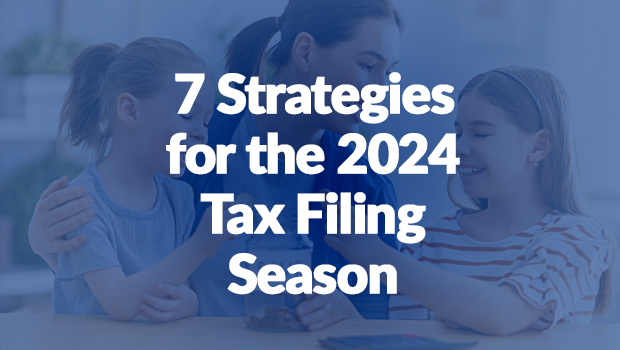The tax season for the 2023 tax year has officially begun and the IRS is now accepting income tax return filings. Whether you prepare and file your returns yourself or hire a professional, here are some tips to file your return as efficiently as possible and gain the biggest financial rewards the tax code allows.
Strategy #1: Prepare and File Electronically
There are three main advantages to preparing and filing your taxes electronically (e-filing). First, it’s more accurate. Mistakes are still possible on electronic returns, but they won’t be due to computational errors. If you have a computational error on your tax return, it probably won’t lead to an audit, but it could certainly lead to delays or the IRS sending you a letter for more information about your income, a credit or a deduction.
Second, it’s faster. The return travels to the IRS practically at the speed of light and once at the IRS, it’ll get processed faster.
Third, it’s more secure. If you mail in your tax return, there’s a bigger chance of your tax return never making it to the IRS. The USPS and other delivery companies are very reliable, but they’re not perfect. The electronic systems used for e-filing aren’t perfect either, but if there’s a problem in the transmission, you’re more likely to know sooner rather than later so you can try again. When e-filing, you have four options:
- Using IRS Free File.
- Using a free tax preparation provider, such as the IRS Volunteer Income Tax Assistance (VITA) or the Tax Counseling for the Elderly (TCE).
- Hiring a tax professional who’s been accepted into the IRS electronic filing program.
- Using the Direct File pilot.
Strategy #2: Use Direct Deposit for Refunds
With direct deposit, the IRS can send a refund more quickly. There’s no check to print and mail and possibly get lost. Choosing direct deposit can easily shave weeks off the time it takes to get your money.
Strategy #3: File Early
The obvious reason for filing early is to get your tax returns done and out of the way sooner. It can also mean getting your tax refund sooner, too. But one of the best reasons to file early is to reduce the risk of tax-related identity theft. By getting your return filed before an ID-theft criminal does, there’s less of a chance of them receiving a tax refund that belongs to you or improperly seeking a tax refund using your identity.
Strategy #4: Look Out for 1099-K
A 1099-K gets generated if you receive payments for the sale of goods or services. These include payments you received from credit, debit or gift cards. They could also be payments received through special apps and online marketplaces (like eBay or Etsy).
Until recently, 1099-Ks were only generated if there were over 200 transactions and those transactions totaled more than $20,000. But thanks to the American Rescue Plan Act of 2021, this threshold was dropped to $600 on any number of transactions. This meant that starting in 2022, a lot more people would start receiving 1099-Ks even if they were just casual online sellers.
This new threshold was put on hold in 2023 (and the IRS plans on using a $5,000 threshold in 2024), but you might still get a 1099-K at the $600 threshold if an online marketplace or payment app provider wasn’t aware of the 2023 hiatus. If you get this 1099-K, you’ll need to account for it on your tax return, either as taxable income or show why the amount on the 1099-K isn’t fully taxable.
Strategy #5: Gather All Potentially Relevant Documents
Even if you think you won’t claim any deductions or credits, you’ll still want to make sure you gather any potentially necessary documents. This is particularly important when using a tax professional, as they can help you review your receipts, invoices, bank statements, etc. to decide if you might be eligible for a tax deduction or credit you might not know about.
Strategy #6: If You Need an Extension, Plan Now
If you need more time to file your taxes before April 15th, you can get an extension. But even if granted, be aware that the extension only applies to your obligation to file your taxes, not pay them. So you’ll still need to be ready to send the IRS an estimated payment of any taxes you might owe.
Strategy #7: Be Prepared to Report Any Digital Asset Transactions
Generally speaking, transactions involving digital assets (like cryptocurrency, virtual currency and non-fungible tokens) should be reported on a tax return. The transaction could lead to taxable income in certain situations, like the sale of a digital asset for traditional currency. The rules are a bit complicated, so if you’re confused or unsure about the tax status and reporting requirements of your digital assets, you should consider consulting with a tax professional.
Kienitz Tax Law is here to help you with your tax issues. Schedule your FREE consultation today!

